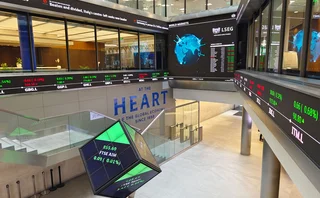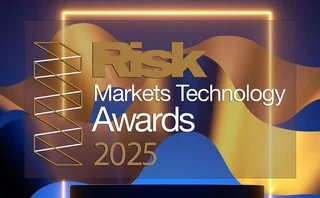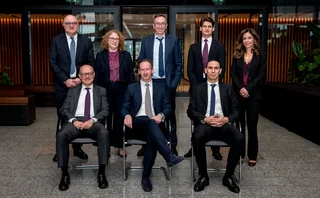
Environmental products house of the year: BNP Paribas
Energy Risk Awards 2021: Bank’s sustainability strategy supports its expanding environmental products suite

Addressing the world’s growing sustainability challenges will touch on every type of economic activity and, by extension, on the full suite of financing and risk management products. That creates enormous opportunity for new product development across the gamut of banking services – as demonstrated by BNP Paribas in its submission for Energy Risk’s Environmental products house of the year.
The French bank has made some headline-grabbing sustainability announcements at the corporate level. These include its pledge to gradually align the carbon-intensity of its loan book with the goals of the Paris climate agreement by 2030, and to integrate the achievement of the UN Sustainable Development Goals into its corporate strategy, including by measuring the funding it directs towards meeting the goals. But it has also moved aggressively to identify environmental opportunities, from addressing climate and other sustainability challenges, to offering environmental, social and governance (ESG)-related solutions to its clients.
As might be expected from a bank with a strong position in commodity markets, the bank is a leading player in carbon trading and structuring. It sees the carbon market beginning to go global.
“We believe the world is moving to a more unified and – potentially – linked global carbon price in the future,” says John Rosai, BNP Paribas’s head of energy trading, natural gas, power and emissions. He notes that the bank began participating in California’s carbon market at the end of last year, in response to customer demand for hedging products in that jurisdiction. His team is also keeping a watchful eye on China’s emissions trading system, which began operating this year but is not currently open to non-compliance entities.

“There’s going to be a huge impetus for nations to start trading emissions on the back of the discussion in Europe to introduce carbon border adjustments,” says Rosai. The European Commission is working on a proposal for a Carbon Border Adjustment Mechanism to protect EU industry by imposing tariffs on certain goods from countries that don’t price carbon. “Exporters won’t face these adjustments if their countries have their own emissions pricing systems,” he explains.
It’s not just regulation that’s driving the carbon markets. Francois Carré, carbon portfolio manager at BNP Paribas, sees the potential for the voluntary carbon market to “grow exponentially”, driven by the growing number of corporate commitments to net-zero emissions. He is a member of the Taskforce on Scaling Voluntary Carbon Markets, established by former Bank of England Governor Mark Carney, to increase the size of the market and ensure it adheres to high environmental and social standards.
“In 2020, the market delivered 180 million tonnes of reductions,” says Carré – equivalent to the annual emissions of just three or four large carbon-intensive companies. He notes constraints on the market, such as the lack of fungibility of voluntary carbon assets and of organised markets on which they can be traded. However, he is confident that, as prices rise as existing supply is absorbed by the market, this demand will spur new projects.
The involvement of financial participants in environmental markets is not without its controversies: some European governments have asked the European Commission to look into the role of speculators in the recent increase of EU allowance (EUA) prices from around €20/tonne ($23/tonne) of carbon dioxide in November to more than €50 in May.
Rosai offers a robust defence of the role of investors in providing liquidity and, crucially, smoothing out the contango in the market. He gives the example of a popular structured product offered by BNP Paribas, among others, which offers investors exposure to the EUA contango by buying the spot and selling EUAs forward. Because emitters prefer to hedge their emissions forward, there is a natural oversupply of spot allowances and a shortage of forward allowances.
“Without these investors, we would probably see a very depressed spot price and a really steep contango – forward prices would be prohibitively expensive, making hedging by emitters very difficult,” says Rosai.
BNP Paribas’ environmental markets offering extends far beyond carbon markets – including involvement in illiquid and specialised markets such as that for Flemish renewable energy green certificates and helping renewable energy projects hedge power exposures as they transition to unsubsidised business models.
And its products also extend beyond commodity markets. The bank has been involved in novel transactions that link corporate financing with their ESG objectives. For example, last year it structured a discounted employee share buyback programme for Enel that links the prices at which the Italian utility buys the shares to achievement of its renewable energy installation targets. It has also piloted a sustainable deposit facility with consumer goods giant Unilever. Under the scheme, launched last November, cash deposits made by Unilever are invested by the bank in projects that contribute to sustainable development goals.
“We recognise we have a vital role to play in accelerating sustainability,” says Rosai. “We’re looking to incorporate ESG and sustainability principles wherever possible across our product suite. The idea is that, by supporting our clients, we can help to make a positive long-term impact.”
Only users who have a paid subscription or are part of a corporate subscription are able to print or copy content.
To access these options, along with all other subscription benefits, please contact info@risk.net or view our subscription options here: http://subscriptions.risk.net/subscribe
You are currently unable to print this content. Please contact info@risk.net to find out more.
You are currently unable to copy this content. Please contact info@risk.net to find out more.
Copyright Infopro Digital Limited. All rights reserved.
As outlined in our terms and conditions, https://www.infopro-digital.com/terms-and-conditions/subscriptions/ (point 2.4), printing is limited to a single copy.
If you would like to purchase additional rights please email info@risk.net
Copyright Infopro Digital Limited. All rights reserved.
You may share this content using our article tools. As outlined in our terms and conditions, https://www.infopro-digital.com/terms-and-conditions/subscriptions/ (clause 2.4), an Authorised User may only make one copy of the materials for their own personal use. You must also comply with the restrictions in clause 2.5.
If you would like to purchase additional rights please email info@risk.net
More on Awards
Clearing house of the year: LCH
Risk Awards 2025: LCH outshines rivals in its commitment to innovation and co-operation with clearing members
Best use of machine learning/AI: CompatibL
CompatibL’s groundbreaking use of LLMs for automated trade entry earned the Best use of machine learning/AI award at the 2025 Risk Markets Technology Awards, redefining speed and reliability in what-if analytics
Markets Technology Awards 2025 winners’ review
Vendors jockeying for position in this year’s MTAs, as banks and regulators take aim at counterparty blind spots
Equity derivatives house of the year: Bank of America
Risk Awards 2025: Bank gains plaudits – and profits – with enhanced product range, including new variants of short-vol structures and equity dispersion
Law firm of the year: Linklaters
Risk Awards 2025: Law firm’s work helped buttress markets for credit derivatives, clearing and digital assets
Derivatives house of the year: UBS
Risk Awards 2025: Mega-merger expected to add $1 billion to markets revenues, via 30 integration projects
Interest rate derivatives house of the year: JP Morgan
Risk Awards 2025: Steepener hedges and Spire novations helped clients navigate shifting rates regime
Currency derivatives house of the year: UBS
Risk Awards 2025: Access to wealth management client base helped Swiss bank to recycle volatility and provide accurate pricing for a range of FX structures








